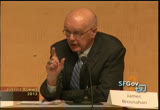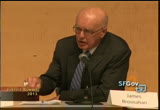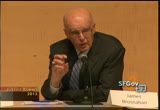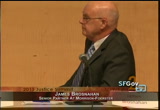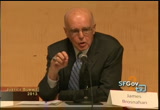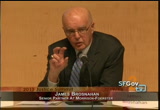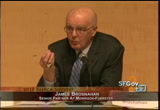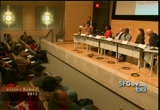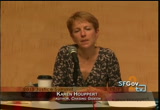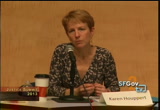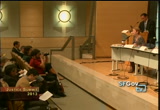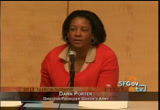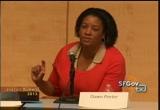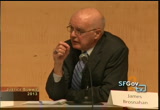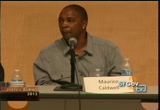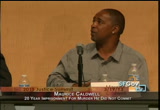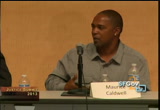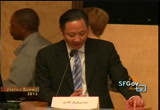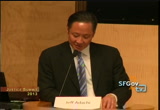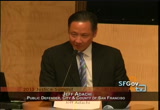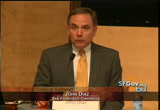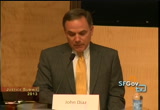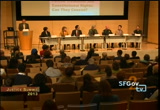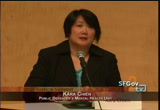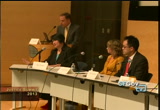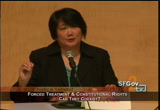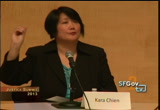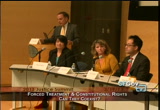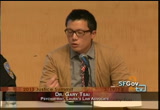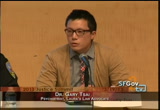tv [untitled] April 23, 2013 2:00am-2:30am PDT
2:00 am
and finally he wondered back and finally the lawyers at a c l u, made a case t . the government was unrepent ant. the best way to do is go to the place and look at the people and be a voice coming out as best you can and say this is what i saw and on the 5th floor, some of them well-dressed people i mentioned in my statistics go into a room to get advice as to how to handle their particular matter to question their connection to their children. and there is a woman there in the line and she thinks that her former husband molested her oldest child and
2:01 am
he now wants custody and he has a lawyer and she doesn't. now i know what lawyers do. i do pro bono. i do money bono too. i go into ceo's offices. we have arguments and we try to bring that to our pro bono. another woman who fell down, disabled, social security. she's independent liver and she's, you talk to her. i'm going to see her on friday. she's okay. she goes to court, her husband
2:02 am
has a lawyer. she doesn't have a lawyer. and her husband is accused by her 14-year-old daughter of molesting her. when the hearing is over and she has no idea how to appeal. knows nothing about the hear say rule, nothing about the law. she wonders the halls like their dead. i have seen it. it's out there and it's not right. it's unacceptable. when the hearing is over, she's denied all connection to her daughter. that is what we are talking about. >> what do you think it's going to take to make society in government to take the step towards gideon and it's what we've talked about. you have
2:03 am
worked on this for many years? >> and the bar association that is represented today. i think we are proud of our city, whatever city might be here today. we are all proud of our city. i like this city because we get ideas here that nobody else gets. some of them are really bad. we are all friends here. right? so, our little committee, we are powerless in this culture. forget about it. we have no cloud. so our slogan is, we don't think, we do. because we don't want to study things. there are people out there studying things. so we want to a supervisor. david chu, in this city, we said here is the problem and he said that is terrible. he's a practicing lawyer and we went for the
2:04 am
2:05 am
legislators. they have been moved out of the county to santa monica. 9 out of 10 who are defending trying to keep their house, 9 out of 10 have no lawyers. on the landlord's side, 9 out of 10 have lawyers. so after you drive all the way to santa monica and after you try to figure out what it is, what the real property laws is in california and what defenses you might have or what arguments you might have, you are faced with a trained lawyer and someone who has been to law school for 3 years, someone whose practiced for some period of time. what we need here to answer your question is a playwright. this is mccobb. this is weird. we are not on
2:06 am
anyone's calendar to speak of. that for some of us, that's what makes it fun. >> thank you. jum. [ applause ] we are now going to take audience questions and answers. no cards. so please pass them in so we can ask questions. you'll let me again ask karen, you spent the last year-and-a-half studying and observing how gideon's promise have been broken. what do you think is an obstacle to closing the gap between rich and poor people's justice. what have we learned about the solution? >> well, i think the biggest obstacle to closing this gap is the political desire to do so
2:07 am
which is kind of -- i talked about that a little bit in my talk. but i think that, you know, and you can learn this lesson in many ways. i don't know when you go to work, i have to learn the same lessons over and over and they are a big epiphany for me each time t epiphany i had while i was working on this book i'm a journalist and i'm a generalist. i was really drowning in it for the first six months when i was reporting. i didn't know what was going on in court, i didn't know the language, i didn't know the process. it was all very complicated. and then i had my little epiphany which was that actually i shaolin to
2:08 am
that little voice and realize what the clients were experienced going through this system and it was disorienting and they don't know. how do you convey that, for me if there was a way to convey that sense of complete to disorientation, then you really understand the need for an attorney. it's so clear. and so, i think for me, it was really a way of understanding what this process was like for clients who are going through the system and conveying that for people and letting them walk in the clients shoes for a while and there are lots of other complicated systemic problems that need to be addressed that you are probably well aware of, financial, cultural and other problems that john talked about. and yet, all of them i
2:09 am
think hinge on this larger issue of public pressure and understanding and really pushing applications legislators, everyone that you have an opportunity to talk to so that they understand what's at stake here because i do think that really, i really believe that americans are interested in fairness. i admit i'm a glass half full person. i believe in fairness and it's so primary of the way we think. you think of little kids arguing. it's one of the first arguments they have. wait, she got more chocolate milk than me. that's not fair. there is this primary interest that we believe in fairness. the challenge for us is how do we bring the public inside this world and make them understand that this is not fair and it
2:10 am
has to change. >> here is our first question from the audience and it's a question i will put to the panel and any of you can respond. it's a great question. is gideon's promise does it extend to our nations immigrants when they are told to plead guilty and they are deported? >> i will start with that because i filmed in georgia. i will tell you about really i think about it like still a lot. a man who was accused of drug trafficking. although the police report as the police officer testified on the stand did not mention drugs. magically the amount of drugs that were not in the police report exceeded the threshold of 45 to life. the man on
2:11 am
trial, his story and the story of a man who had pleaded guilty with him was that he was a roofer in georgia. his friends said do you want to go to lunch, i have to make a stop. he's a passengerer in a car and unaware there were drugs in the car. after a day-and-a-half on trial he's convicted alone. he doesn't speak any english. so there is a translator who is trying her best to keep up with everything that's happening but you can tell he has no idea of what's happening. a day-and-a-half after being convicted with no evidence against him, nothing to point to the fact that this man was in anyway involved in trafficking, of course crystal meth, he was sentenced to 25 years to life in prison. so when they said guilty i had never seen a person's face like
2:12 am
that. he did understand that word and he was taken in handcuffs and incredulous that this could have happened to him. what happened is he goes to prison and now deportation proceedings begin. i can't remember your original question. i think that immigration and how we are in criminalizing in an effort to deport people is one of the more disgusting and shocking things i saw repeatedly in the course of filming. >> i think briefly that those of you in the i immigration area understand what it's like. i tried a sanctuary case, i hope there is no other place in america where the authorities create the people that they process the way they do that there may be some jails where they do that. unless you have
2:13 am
seen it, you cannot imagine what goes on and they separate families, they separate families, this is a nation of family values. and so i thought in my youth that someone would come along and reform the immigration status. i may not see it myself the way it's going. >> just moving to the next question for maurice. did you feel discouraged in your fight for innocence when you were incarcerated and did you feel like it was you against the system? >> yes. i felt that, you know from day one. because it's like, even going through trial, it was like i felt that i had no way, story, even if my story was true, there was no way. my character, from where i was
2:14 am
from, it was like, i'm already guilty. so for intimidation, i didn't feel intimidated. i always like i said, the hope i had from one end, it deteriorated from me even losing faith from the system and the police arresting me. the lawyers were the ones that helped me get out and the same people that i needed to help me get out were the ones that i was like mad at. so mad, my madness made me fight. so i stayed fighting but i never felt like it was going to be over. i got a niece that is 23 years old right now, even in 2011 when my case got over turned and i called her and i said i will be home. she said
2:15 am
you say that all the time. so i never felt like i was giving up. no matter how much time i got because i knew the facts behind it and it was like the principle facts behind it refused to let me give you no matter what. even coming home, when my case got accepted. it was like, i'm going home. it still didn't happen. i'm thinking in 60 days the court will, i'm telling everybody i'm going home and there is people all the time up in there educating myself about the law, i know is fast to get in there, but when the wheels are turned to come home, it's slow. i couldn't accept it. people are like they are going to do this to time. i said no, this is clear. this was what was supposed to have been done from the beginning. even my
2:16 am
families, my loved wupz ones that lost. that made me fight more. i never gate gave up my fate. my hope is restored. >> with that i would like to thank all of our panelist. thank you. [ applause ] and we are now going to move to our second panel. while they take their seats, this idea of forced treatment versus constitutional rights has always been a tension that we've had in our criminal justice system. there is an issue that came up earlier this year that you may have read about involving this implementation of a court that was supposed to treat individuals who were suffering
2:17 am
from long-term alcoholism. and the court was set up in a way where individuals were not being arrested for a crime but instead were being jailed for contempt of court as long as 120-150 days in jail. my office, when we learned of this, we were not involved in the creation of it, challenged it because we believed that it was unconstitutional because you were not charging people with crimes and you are jailing people for contempt of court when legally they hadn't failed to come to court because in most of these cases they had simply been served with citations. so the legal challenge is filed and the court was found to be unconstitutional by the court of appeals. but it still left a
2:18 am
question, one of the colleagues raised this in his column, how do you deal with the tension between constitutional rights and wanting to provide treatment to individuals who need it? >> so out of that came the idea for this panel. actually action behind this panel as to what to do. we do have a lot of collaborative court's in san francisco of mental health court, drug court. domestic violence court. but san francisco is at the cuff of considering what measures to take in serving individuals who suffer from mental illness and also individuals who suffer from drugs, substance abuse, chronic conditions.
2:19 am
>> i would like to introduce john diaz from the san francisco paper, san francisco chronicle. i'm very pleased to introduce him now. john? [ applause ] >> thank you very much, jeff and good morning and welcome to our panel this morning on forced treatment and constitutional rights. can they coexist? i am john diaz, the editorial page editor from the san francisco chronicle and i'm moderating this modern's discussion with our distinguished panel. forced treatment as jeff node is one of the most contentious issues of mental health. as you look at our discussion there are informed and panelled views from both sides. there has been
2:20 am
many debates on how to implement lawyer's law which consist of outpatient treatment. it was named after laura wilcox, a mental health worker who had been shot to death by a man who refused treatment. the county r remains the only county to implement the law. there have been other counties in los angeles county and other counties who are considering it. >> why have they not adopted the law. what is it about forced treatment and the consequences for an allowing refusing treatment. we have a
2:21 am
panel who have a knowledge of this subject in some cases because of their professional endeavors and in some cases because of personal experiences and in some cases, both. let me introduce them. karen chen is an attorney manager for the san francisco public defenders office, kathy, whose son battled mental illness, can is a subject treatment expert for the medical center. danny is the associate director for the serial neeb breet program for the city of san diego. and san francisco chief of police. gary is a psychiatrist and laura's law advocate and eduardo vega of the mental health association of san francisco. let me start by opposing a
2:22 am
question to karen chen from the public defenders office. karen, can you -- how about if you start by giving us an overview of how the city handles this conflict between treatment and civil liberties. >> an involuntary hold starts in san francisco when a peace officer or a clinician makes the determination that the person is due to a mental disorder, is a danger to others or danger to self or gravely disabled. gravely disabled means that person does not have the ability to provide for basic needs such as food, clothing and shelter. and the legal representation starts in most cases the first 3 days of the involuntary hold during the initial psychiatric evaluation and then the legal
2:23 am
representation also continues with if the person is asked to be stayed or referred for further treatment up to 14 days. during this phase, the attorneys will represent the clients about whether or not they will have to stay on this hold, whether they have to take medications. if a person after at the end of the 14 day hold is found that may need further treatment, the person maybe subject to a conservatorship under the act of the conservator in the california constitution code and representation continues and after an initial established conservatorship such as
2:24 am
objection to the conservatorship and also propose medical and psychiatric treatment. one of the things that in san francisco that is up to 2012 we are one of the three counties that consistently offers judicial review when there is a recommendation to take away someone's right to refuse medications. the law requires that anyone even in involuntary commit a person the right to refuse psychiatric medication in a non-emergency situation unless there is a judicial find that go this person lacks the capacity or ability to make rational decisions regarding his or her medical treatment. in further response to the need for make sure that treatment is provided and people with
2:25 am
psychiatric disability have access to trees and maintain stability in the community, san francisco in 2011, we started a pilot project and that pilot project is called independence in the community, pilot project. it's cipp. this is a collaboration among department of public health, office of the public conservator, san francisco district attorney as counsel for the public conservator and the superior court of san francisco and office of the public defender. the key feature of this program is to have someone who has starting a serial hospitalization and the provider identifies this person and receives this person to this program. the program is voluntary. the person agrees
2:26 am
not to refuse medication. they come in to check in with the judge on a regular basis and attorney is provided to represent this patient in all proceedings. if they feel at some point they don't need the program, they have the right to ask to leave. we have them participating in this program. >> thank you very much. let's continue this discussion. let's go to gary sigh. you have studied this issue from a personal standpoint and you have a family member with mental health issues. as you explained to me in the e-mail, one of the problems here is people with certain mental health problems may not even beware of their condition. give us a sense of what you mean by that? >> yeah. there have been some
2:27 am
studies looking at individuals with bipolar disorders as well as skwiz schizophrenia. 40-60 percent have systems of lacking awareness. what this means is basically there is damage to certain pathways of the brain responsible for self reflection and self awareness. this has been shown in neurology for individuals after they have had strokes with particular areas of the brain that have been damaged, has also been shown for individuals with dementia and in my clinical experience and my personal experience with my family member, it's very clearly an issue in mental health as well. the dilemma is
2:28 am
that if there are individuals who are biologically unable to self reflect and have an awareness of their illness, they oftentimes very frequently will not want to engage with treatment and do not see themselves as needing treatment. and this is beyond psychological denial, kind of realizing deep down that there is an issue but not wanting to accept it. it's also beyond simple stubbornness. it's a natural inability to realize that there may be something wrong. one particularly pertinent example is a neurology for certain people after strokes where one side of their body is paralyzed. a doctor will ask them to do a task with a paralyzed side and oftentimes these individuals
2:29 am
will say that they are actually lifting their arm when clearly they are not or come up with a reason for why they are unable to do it. i have arthritis in my shoulder. it's a big problem in mental health and particularly becomes problematic when there are issues of involuntary treatment being considered and all the dell icate sea of that issue. >> you went through a parents nightmare with your son diagnosed with schizophrenia and now held accountable for the death of a man. how is your understanding the need for this law and the need for treatment? >> my
44 Views
IN COLLECTIONS
SFGTV2: San Francisco Government Television Television Archive
Television Archive  Television Archive News Search Service
Television Archive News Search Service 
Uploaded by TV Archive on

 Live Music Archive
Live Music Archive Librivox Free Audio
Librivox Free Audio Metropolitan Museum
Metropolitan Museum Cleveland Museum of Art
Cleveland Museum of Art Internet Arcade
Internet Arcade Console Living Room
Console Living Room Books to Borrow
Books to Borrow Open Library
Open Library TV News
TV News Understanding 9/11
Understanding 9/11